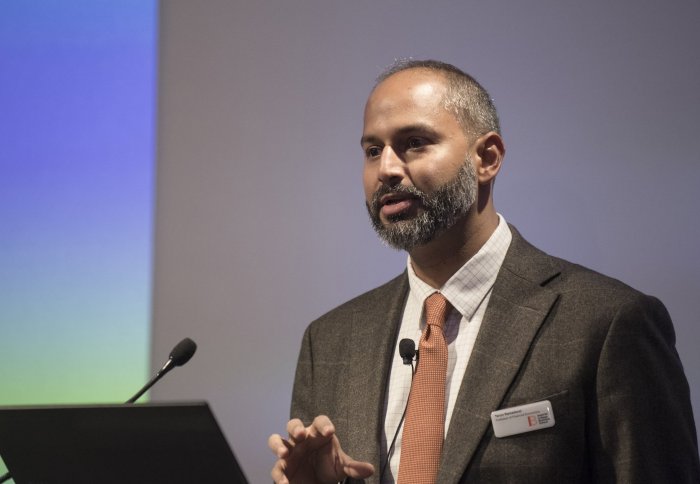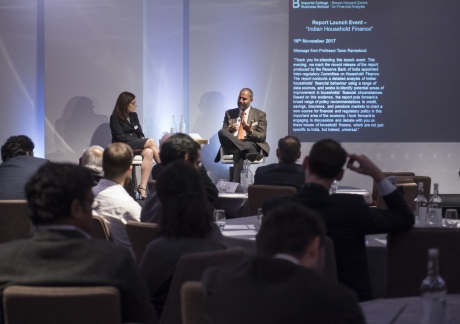Indian households should embrace fintech to manage their money

Indian households should embrace technology to enable them to make wiser financial decisions, suggests an academic from the Business School.
Speaking at the Report of the Household Finance Committee launch event, Tarun Ramadorai, Professor of Financial Economics at Imperial College Business School, outlined the findings of a report he contributed to, which looks at how Indian households manage their money, and what could be done to improve their financial transactions.
Professor Ramadorai told the audience that households should embrace the use of financial technology (fintech) products to streamline the bureaucratic and often lengthy process of engaging with the formal financial world in India.
Watch Professor Ramadorai discuss the findings of his report in this video:
Both regulators and businesses should do more for Indian households to make them aware of the products and services available to them, said Professor Ramadorai. He also argued that more needs to be done to help low-income, rural households who may have to travel for several days to towns and cities to file complaints if they’ve been mis-sold a financial product.
It should be the right of all individuals, and not just the wealthy, to have access to the best financial services.
– Professor Tarun Ramadorai
Professor of Financial Economics, Imperial College Business School
Professor Ramadorai said the technology is already in place to verify households’ identities and their eligibility for certain financial products, which can be accessed in a matter of seconds, using something as simple as an iris scan. However, for this to happen there needs to be the right changes in regulation to successfully encourage households to adopt fintech solutions.
Professor Ramadorai added: “Fintech solutions in India could be the best in the world. It should be the right of all individuals, and not just the wealthy, to have access to the best financial services. However, the adoption of these services cannot be at the expense of data privacy, so safeguards need to be built in.”
The Imperial College Business School academic outlined a number of challenges facing Indian households when managing their finances. These include an overreliance on investment in real estate and gold, and low levels of investment in insurance and pensions.
The report also identified a general distrust by many Indians of formal financial institutions, which is often exacerbated by a lack of education. The result is that people are driven to non-institutional sources of finance in emergencies, such as moneylenders, who can charge high interest rates, or friends and family members, who are often opaque in their dealings, which can lead to hidden financial consequences.
Professor Ramadorai asked an audience comprising Business School staff, students, alumni and industry figures: “Has anyone taken a loan from a friend or family member? Is the interest rate really zero? All around the world, so-called informal loans can impose societal obligations that can last an entire lifetime. For low-income families, this can be a very serious problem, essentially locking them into these transactional relationships.”

Professor Tarun Ramadorai discusses Indian household finance with Professor Antoinette Schoar, Professor of Financial Economics
Change will take time
Professor Ramadorai’s lecture was followed by a conversation with Professor Antoinette Schoar, a visiting professor from MIT.
Professor Schoar said: “It’s unique, advancing our understanding of systematic issues. The insights are fascinating in their level of detail and seriousness. Most importantly, the report takes a very holistic and balanced view.”
The professors explored some of the challenges faced in India when trying to shake up a largely-nationalised financial sector in which big players are reluctant to risk their market share or to offer new products.
The role of women, who often manage Indian household finance, was also discussed.
“Sometimes social structures can be slow to change,” said Professor Ramadorai. “One of the auxiliary benefits of fintech is to help empower women operating in patriarchal environments, which is yet another reason to push the policy.”
The conversation was later opened to the floor, and covered areas including rural-to-urban migration, the dangers of passing laws without considering the consequences, and the resourcefulness of the Indian people.
Professor Ramadorai said he was confident that some of the proposed changes would take place. However, he warned that this process could take time and would be incremental.
“It’s important to recognise that everything will not get done immediately. Historically, it has generally taken at least three committees to concur on the benefits of a recommendation before it has been adopted.”
An intellectual contribution, a tangible outcome
The report was commissioned by the Reserve Bank of India – India’s central bank, which constituted the Household Finance Committee, of which Professor Ramadorai was the chair.
The report was published by the RBI on August 24. The in-depth original research conducted by the committee included data from China, Thailand, the USA, the UK, Australia, Germany and Australia, in addition to using several data sources from India.
This article was authored by freelancer Mansoor Iqbal.
Article text (excluding photos or graphics) © Imperial College London.
Photos and graphics subject to third party copyright used with permission or © Imperial College London.
Reporter
Laura Singleton
Communications Division
